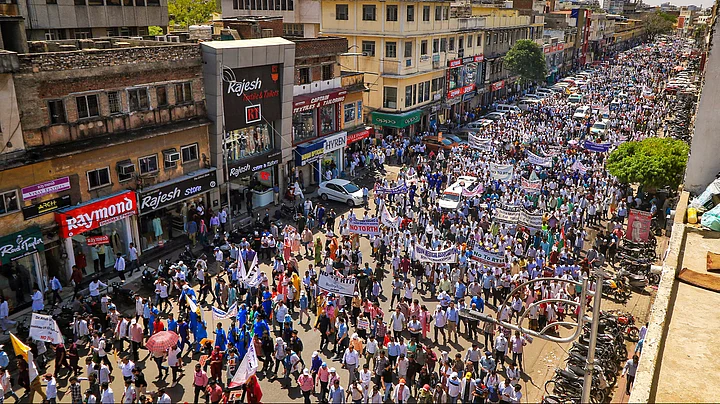The recently passed right to health bill by the State of Rajasthan has caused an uproar inrthe State. Being the first State of the Country to provide its residents healthcare as a right, the right to health is a progressive piece of legislation.
The law recognizes free right to health for every resident of the state in any clinical establishment. Clause 3 of the act provides a duty to each clinical establishment of the state to provide free health services without any prior payment in case of any emergency. The inclusive nature of the act also mandates the provision of reimbursement of the doctors and the private hospitals.
The right to health act by the State of Rajasthan is a welcome step towards universal and affordable access to healthcare. However it also requires fixing the institutional gaps like the vacancies in the hospitals, access to medicines, bridging the gaps and connecting more people with the existing scheme like Chiranjeevi.
The Constitutionalisation of the Right to Health
The Right to healthcare access or universal healthcare in India has not been explicitly recognized under the constitutional framework. The argument of its inclusion particularly stems from problems of access to healthcare in India. In India, an Oxfam report reveals that one in every four people faces discrimination in accessing healthcare on the basis of caste, gender, and religion.
The determining factor in these considerations is not only the aspect of caste, religious, and gender identity, but also the economic status. The legal framework in the form of Directive principles of state policy, mandates the states to take positive action for ensuring the access to healthcare.
The Directive Principles of State Policy in Part IV of the India Constitution provide a basis for the right to health. Article 39 (E) directs the State to secure health of workers, Article 42 directs the State to just and humane conditions of work and maternity relief, and Article 47 casts a duty on the State to raise the nutrition levels and standard of living of people and to improve public health.
Moreover, the Constitution does not only oblige the State to enhance public health, it also endows the Panchayats and Municipalities to strengthen public health under Article 243G (read with 11th Schedule, Entry 23).
The court in India has also interpreted the right to health in good spirit in several cases. The Supreme Court in the case of Bandhua Mukti Morcha v Union of India & Ors interpreted the right to health under Article 21 which guarantees the right to life.
The case of Robust Legislative Framework in India
In the case of State of Punjab & Ors v Mohinder Singh Chawla, the apex court reaffirmed that the right to health is fundamental to the right to life and should be put on record that the government had a constitutional obligation to provide health services. In State of Punjab & Ors v Ram Lubhaya Bagga, the court went on to endorse the State’s responsibility to maintain health services. Additionally, the 15th Finance commission recommended declaring the Right to health as a fundamental right.
Evidence in India shows the rampant discrimination in healthcare based on caste, religion, gender, and economic considerations. Quite recently during the pandemic and even during the vaccine distribution this, faultline has erupted.
Currently India’s public health act lacks transparency and state duty. Neither the clinic establishment act 2010 nor any other statute comprehensively cover the state’s duty with regard to citizen’s concern of healthcare.
As a signatory to the ICESCR, India has obligations under Article 2(2) to "guarantee that (economic, social and cultural rights) … will be exercised without discrimination of any kind as to race, color, sex, language, religion, political or other opinion, national or social origin, property, birth or other status."
The gradual incorporation of the international principles is not only rooted in India's parliamentary framework and conventions but also in the jurisprudence of Supreme Court more recently in the case of Navtej Singh Johar and Ors.
The Right to Health Act of Rajasthan is a step in the right direction for universal healthcare. In a stratified society coupled with gross income inequality it will be beneficial for the poor and underprivileged. Moreover the act will give impetus to the citizen’s and civil society's claim for a robust legislative framework for healthcare at National level in absence of the constitutional recognition of right to health.
(Rajesh Ranjan is a Samta fellow, working in Rajasthan on Constitutional literacy, legal aid and community engagement.This is an opinion article and the views expressed above are the author’s own. The Quint neither endorses nor is responsible for them.)
